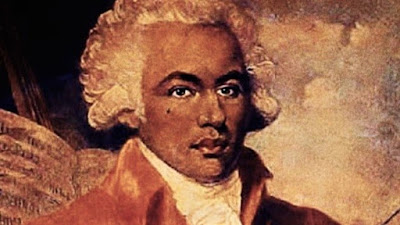November 10, 2020
History will be made on Nov. 14 at 5 p.m. PST when the Colburn School and LA Opera together present a free stream of the new critical edition of Joseph Bologne’s comic opera The Anonymous Lover (L’Amant anonyme). Not only will the performance be one of the very few modern productions of a 240-year-old opera by a mostly forgotten 18th-century Black composer, it will also present a unique opportunity to explore the potential of the streaming medium as a conduit for live opera in and beyond the COVID-19 era.
If you’ve never heard of Joseph Bologne (aka Boulogne) (1745-1799), whom King Louis XV granted the title Le Chevalier de Saint-Georges, it is likely due to his origins as the son of an enslaved African woman and a wealthy French plantation owner. Bologne was born and raised on the French Caribbean island of Guadeloupe. By the time he was 10, he began to receive an elite education in France, which included private lessons in music and fencing. Bologne rapidly blossomed into one of the most versatile and talented members of the aristocracy. Initially prized for his outstanding fencing and athletic abilities, he became a member of the Gendarmes de la Garde du Roi and was known as “the god of arms.” He was admitted to the Royal Academy as a professor and soon became a star of Parisian society.
Even before he had reached France, Le Chevalier de Saint-Georges began violin studies with his father’s estate manager. As befitted the son of nobleman who was a patron of the arts and had works dedicated to him by the violinist Antonio Lolli and the composer Johann Stamitz, Bologne eventually took lessons from Jean-Marie Leclair and possibly Lolli. Both Lolli and François-Joseph Gossec dedicated works to him.
Four years after joining Le Concert des Amateurs as first violinist, 24-year-old Bologne took over the orchestra. After becoming leader of its successor, Le Concert de la Loge Olympique (aka Le Concert Olympique), he commissioned, premiered, and edited the first published edition of Haydn’s six “Paris” Symphonies.
Bologne’s first documented compositions date from 1770 and 1771. By the time of his death, he had composed at least six operas, only one of which has survived. LAO’s production of The Anonymous Lover will incorporate the only surviving aria from another of Bologne’s opera, Ernestine — an aria that LA Opera Music Director James Conlon considers “extraordinary.” The opera will be sung in French (with English subtitles) save for its dialogue, which will be delivered in English.[1]
It is quite possible that Mozart, who stayed under the same roof as Le Chevalier de Saint-Georges for a month or two, was inspired to write his first Sinfonia Concertante after hearing the other composer’s music. Had it not been for opposition to his “mulatto” identity, Bologne might have become artistic director of the Royal Academy of Music (the Paris Opéra). Nonetheless, he made his mark as a renowned violinist, composer, and, during the French Revolution, the colonel of a troop of 1,000 “colored” soldiers.
That regiment, known as Le Légion Franche de Cavalerie des Américains (American free legion of cavalry), soon became known as the Légion Saint-Georges. Despite Bologne’s fame and revolutionary ardor, he barely escaped the guillotine. That the charges against him were trumped up should come as no surprise. His work as a composer declined post-revolution, as did his fame and fortune. He eventually succumbed to bladder disease at age 44, but not before spending two years as director of a new orchestra, Le Cercle de l’Harmonie.
Although Bologne was lamentably dubbed the “Black Mozart” in successive centuries, Conlon despises and rejects the title. He also acknowledges the uncertainty around the composer’s name and key aspects of his history.
***
“I look at an opera by an interesting 18th-century composer and ask why it isn’t being performed. When I look into the question and scratch away the surface, it’s basically the same problem: racism. Racism was one of the many great crimes of the Nazi regime, but it is a silent crime that predominantly white European and American societies practiced. I have never heard anyone suggest that the lack of attention to St. George’s music was for any reason other than he was Black. There’s been an explosion of interest in him in the last four months. Let’s hope that lasts, and that it bears fruit. His will be like a recovered voice.”
The recovery will continue beyond the production. Not only will the performance be available for viewing through Nov. 29, but it will be followed by Conlon’s plans to perform some of the violin concertos and the Sinfonia Concertante. With luck, those performances will be recorded. The music of other forgotten Black composers are also on Conlon’s to-do list. In addition, The Colburn School’s Colburn Artist Series will host the Viano String Quartet performing Bologne’s String Quartet, Op. 6, No. 1, on Dec. 20.
***
Tickets are free at www.laopera.org/lover.






No comments:
Post a Comment